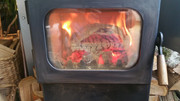I live in a rural area and we usually have pretty good air quality, being well away from any cities or built up areas. I've been monitoring the air quality here for a few years now, using a particulate monitor that logs the quantity and size of particulates in the air. One thing that shows very clearly is that the air quality here deteriorates when our nearest neighbour (around 300m away) lights their wood stove. On cold nights we can easily get air pollution levels that are far worse than those on a busy city street. We rarely seem to get any visible air pollution, and our neighbours stove doesn't really seem to emit smoke, it seems that whatever it is releasing to the air is invisible.
I was really surprised by this at first, but having done some research I came across this recent Guardian article and then traced back some of the research it was based on:
https://www.theguardian.com/environment ... tion-fires
The article seems to be true, as far as I have been able to tell, and it seems it is a well known problem, as I found a BMJ article examining the causes of harmful air pollution in a town in Tasmania:
https://www.bmj.com/content/346/bmj.e8446 .
It really does seem as if the small percentage of people burning wood are now creating the biggest contribution to particulate emissions here. On a bad night our monitor often shows that we have PM10 levels of around 50µg/m³, PM2.5 levels of around 25µg/m³, which is a lot higher than the street level pollution in big cities from around 30 years ago, before stricter vehicle emission controls. We regularly see winter air pollution levels that exceed those in cities that have imposed pollution control measures, in fact the air quality here can often be worse than that at street level in central London.
It seems that one of life's pleasures, sitting in front of a warm stove on a winter's evening, is probably far worse for our health than driving around in a big diesel truck.
25 off 250W Perlight solar panels, installed 2014, with a 6kW PowerOne inverter, about 6,000kWh/year generated
6 off Pylontech US3000C batteries, with a Sofar ME3000SP inverter
